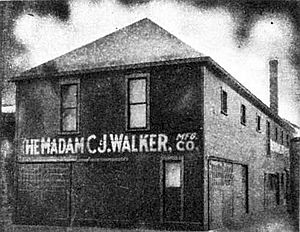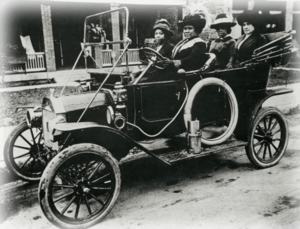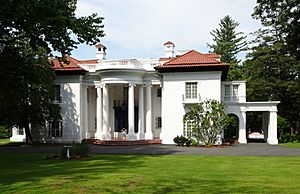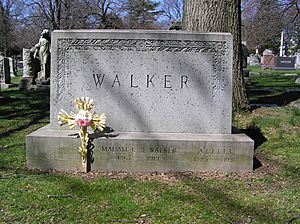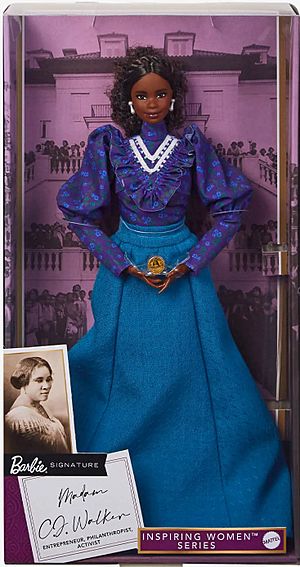Madam C. J. Walker facts for kids
Quick facts for kids
Madam C.J. Walker
|
|
|---|---|
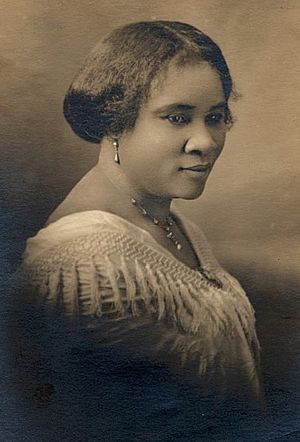
Walker c. 1914
|
|
| Born |
Sarah Breedlove
December 23, 1867 |
| Died | May 25, 1919 (aged 51) Irvington, New York, U.S.
|
| Resting place | Woodlawn Cemetery (Bronx, New York) |
| Occupation |
|
| Known for | Founder of Madam C. J. Walker Manufacturing Company |
| Spouse(s) |
|
| Children | A'Lelia Walker |
| Relatives | A'Lelia Bundles (great–great granddaughter) |
Madam C.J. Walker (born Sarah Breedlove; December 23, 1867 – May 25, 1919) was an amazing African American businesswoman. She was also a generous person who gave a lot to charity and fought for social justice.
Many people consider her the first self-made female millionaire in America. She earned her money by creating and selling hair care products. These products were specially made for black women. She started a company called the Madam C. J. Walker Manufacturing Company. Madam Walker was also known for helping others. She gave money to groups like the NAACP. Her beautiful home, Villa Lewaro, was a meeting place for the African-American community. When she passed away, she was one of the wealthiest black businesswomen in America.
Contents
Early Life and Challenges
Sarah Breedlove was born on December 23, 1867, in Delta, Louisiana. Her parents were Owen and Minerva Breedlove. She had five brothers and sisters. Her older siblings were born into slavery. But Sarah was the first in her family to be born free. This happened after President Lincoln signed the Emancipation Proclamation.
Sadly, Sarah's mother died in 1872. Her father passed away just a year later. By age seven, Sarah was an orphan. At 10, she moved to Vicksburg, Mississippi. She lived with her sister Louvenia and her brother-in-law. Sarah started working as a house helper when she was still a child.
Starting a Hair Care Business
Sarah had problems with her own hair and scalp. She suffered from severe dandruff and hair loss. This was partly due to skin issues and harsh products used for cleaning. Also, many people at that time didn't have indoor plumbing. This made it hard to wash hair often.
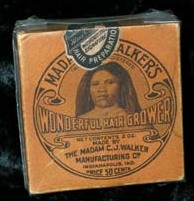
Sarah learned about hair care from her brothers. They were barbers in St. Louis. Around 1904, she started selling products for Annie Turnbo Malone, another black hair-care entrepreneur. While working for Malone, Sarah began to create her own products.
In 1905, Sarah and her daughter moved to Denver, Colorado. She kept selling Malone's products. But she also worked on her own hair care business. Some people said she used a formula similar to Malone's.
Madam C.J. Walker's Company
After marrying Charles Walker in 1906, Sarah became known as Madam C. J. Walker. She called herself an independent hairdresser. She also sold her own cosmetic creams. Her husband helped her with advertising. Sarah sold her products door-to-door. She taught other black women how to care for their hair.
In 1906, Madam Walker put her daughter in charge of mail orders in Denver. She and her husband traveled to grow the business. In 1908, they moved to Pittsburgh, Pennsylvania. There, they opened a beauty salon. They also started Lelia College. This school trained "hair culturists." Madam Walker wanted black women to be financially independent. She created training programs for her sales agents. These agents earned good money.
In 1910, Madam Walker moved her main business to Indianapolis. She bought a house and factory there. Later, she built a new factory, hair salon, and beauty school. She also added a lab for research. Many of her company's employees were women. They held important management jobs.
Walker's hair care system helped hair grow and kept the scalp healthy. It included a shampoo, a special pomade, lots of brushing, and using hot combs. This method made dull hair soft and shiny. Her products had competitors. Other companies in the U.S. and Europe made similar items. Her main rivals were Annie Malone's Poro System and Sarah Spencer Washington's Apex System.
Between 1911 and 1919, Madam Walker's company hired thousands of women. By 1917, about 20,000 women had been trained. These sales agents demonstrated products in their homes and salons. They traveled across the United States and the Caribbean. Madam Walker understood the power of advertising. She advertised in African-American newspapers and magazines. Her frequent travels also helped make her products famous.
Besides sales training, Walker taught black women how to manage money. She showed them how to build their own businesses. She encouraged them to be financially independent. In 1917, she organized her sales agents into clubs. This led to the National Beauty Culturists and Benevolent Association of Madam C. J. Walker Agents.
Their first meeting was in Philadelphia in 1917. About 200 women attended. This was one of the first national meetings for women entrepreneurs. Madam Walker gave prizes to women who sold the most products. She also rewarded those who gave the most to charity. After her death, her company grew even more. It expanded to countries like Cuba, Jamaica, and Haiti.
Activism and Giving Back
As Madam Walker became wealthier, she spoke out more. In 1912, she spoke at a meeting of the National Negro Business League. She proudly said: "I am a woman who came from the cotton fields of the South. From there, I was promoted to the washtub. From there, I was promoted to the cook kitchen. And from there, I promoted myself into the business of manufacturing hair goods and preparations. I have built my own factory on my own ground."
She helped raise money for a YMCA in Indianapolis's black community. She also gave money for scholarships to the Tuskegee Institute. Other groups she helped included Flanner House in Indianapolis and the Bethel African Methodist Episcopal Church. She also supported schools like Mary McLeod Bethune's school in Daytona Beach, Florida. Madam Walker also supported the arts.
Around 1913, her daughter A'Lelia moved to Harlem. In 1916, Madam Walker joined her in New York. She left her management team in Indianapolis to run the company. In 1917, Walker hired Vertner Woodson Tandy, a black architect. He designed her house, Villa Lewaro, in Irvington-on-Hudson. She wanted Villa Lewaro to be a place for community leaders. It cost $250,000 to build. She moved in during May 1918.
Madam Walker became more involved in politics in New York. She gave talks on important social issues. Her friends included Booker T. Washington and Mary McLeod Bethune. During World War I, she helped with the Circle For Negro War Relief. She also pushed for a training camp for black army officers. In 1917, she joined the National Association for the Advancement of Colored People (NAACP) committee in New York.
Her business profits helped her give to charity. In 1918, the National Association of Colored Women's Clubs honored her. She had given the largest individual gift to save Frederick Douglass's house. Before she died in 1919, Walker promised $5,000 to the NAACP's anti-lynching fund. This was the biggest gift the NAACP had ever received from one person. She left nearly $100,000 to charities and individuals in her will. She wanted two-thirds of her future company profits to go to charity.
Personal Life
Family
In 1882, Sarah married Moses McWilliams. They had one daughter, Lelia McWilliams, born in 1885. Moses died in 1887.
In 1888, Sarah and her daughter moved to St. Louis. Sarah worked as a laundress. She earned very little money. But she was determined to earn enough for her daughter's education. She remarried in 1894 to John Davis, but they separated around 1903.
In 1906, Sarah married Charles Joseph Walker. He was a newspaper advertising salesman. This is how she became known as Madam C. J. Walker. They divorced in 1912. Her daughter, Lelia McWilliams, later took her stepfather's last name and became A'Lelia Walker.
Faith
Madam Walker was a Christian. Her faith greatly influenced her desire to help others.
Death and Legacy
Madam C. J. Walker passed away on May 25, 1919. She was 51 years old. She died from kidney failure and high blood pressure. She is buried in Woodlawn Cemetery in New York City.
Her daughter, A'Lelia Walker, took over as president of the Madam C. J. Walker Manufacturing Company.
Interesting Facts About Madam C. J. Walker
- Madam Walker only had about three months of formal schooling. She learned to read and write in Sunday school.
- When she died, she was considered the wealthiest African-American woman in America.
- In 1917, she built her amazing $250,000 mansion, Villa Lewaro.
- A museum in Atlanta is dedicated to Madam Walker. It is located where a Madam C. J. Walker Beauty Shoppe used to be.
- She was added to the National Women's Hall of Fame in 1993.
- In 1998, the United States Postal Service released a stamp honoring Madam Walker.
- In 2022, Mattel created a Madam C.J. Walker Barbie doll. It is part of their Inspiring Women collection.
Madam C.J. Walker Quotes
- "If I have accomplished anything in life, it is because I have been willing to work hard."
- "Don't sit down and wait for the opportunities to come. Get up and make them."
- "I got my start by giving myself a start."
- "I have made it possible for many colored women to abandon the washtub for a more pleasant and profitable occupation."
- "My object in life is not simply to make money for myself or to spend it on myself in dressing or running around in an automobile, but I love to use a part of what I make in trying to help others."
In Popular Culture
In 2006, a play called The Dreams of Sarah Breedlove was written. It told the story of Madam Walker's life.
TV Series
In 2020, actress Octavia Spencer played Madam Walker in a TV series. It was based on a book about Walker's life. The series was called Self Made: Inspired by the Life of Madam C. J. Walker. Some people felt the show changed parts of her real story.
Documentary
Madam Walker is also featured in a 1987 documentary. It is called Two Dollars and a Dream. The filmmaker, Stanley Nelson Jr., was Madam Walker's lawyer's grandson. He had access to her company's old records. He also interviewed people who worked for her.
Tributes and Awards
Many awards and scholarships are named after Madam Walker:
- The Madam C. J. Walker Business and Community Recognition Awards honor her. They give scholarships to amazing women in the community.
- The Madame Walker Theatre Center in Indianapolis gives Spirit Awards. These awards honor leaders in business, charity, and the arts.
See also
 In Spanish: Madam C. J. Walker para niños
In Spanish: Madam C. J. Walker para niños
 | Chris Smalls |
 | Fred Hampton |
 | Ralph Abernathy |


